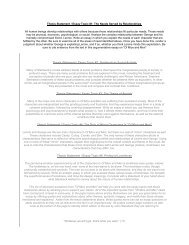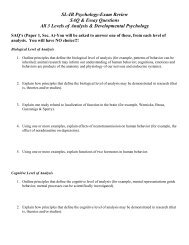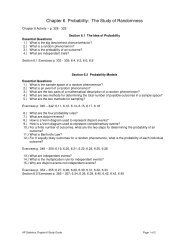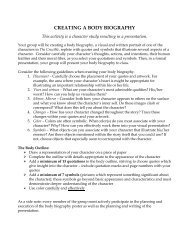What Makes Us Moral by Jeffrey Kluger TIME Magazine ...
What Makes Us Moral by Jeffrey Kluger TIME Magazine ...
What Makes Us Moral by Jeffrey Kluger TIME Magazine ...
You also want an ePaper? Increase the reach of your titles
YUMPU automatically turns print PDFs into web optimized ePapers that Google loves.
While it's impossible to directly measure empathy in animals, in humansit's another matter. Hauser cites a study in which spouses or unmarried couplesunderwent functional magnetic resonance imaging (fMRI) as they weresubjected to mild pain. They were warned before each time the painful stimuluswas administered, and their brains lit up in a characteristic way signaling milddread. They were then told that they were not going to feel the discomfort butthat their partner was. Even when they couldn't see their partner, the brains ofthe subjects lit up precisely as if they were about to experience the painthemselves. "This is very much an 'I feel your pain' experience," says Hauser.The brain works harder when the threat gets more complicated. Afavorite scenario that morality researchers study is the trolley dilemma. You'restanding near a track as an out-of-control train hurtles toward five unsuspectingpeople. There's a switch near<strong>by</strong> that would let you divert the train onto a siding.Would you do it? Of course. You save five lives at no cost. Suppose a singleunsuspecting man was on the siding? Now the mortality score is 5 to 1. Couldyou kill him to save the others? <strong>What</strong> if the innocent man was on a bridge overthe trolley and you had to push him onto the track to stop the train?Pose these dilemmas to people while they're in an fMRI, and the brainscans get messy. <strong>Us</strong>ing a switch to divert the train toward one person instead offive increases activity in the dorsolateral prefrontal cortex--the place where cool,utilitarian choices are made. Complicate things with the idea of pushing theinnocent victim, and the medial frontal cortex--an area associated with emotion--lights up. As these two regions do battle, we may make irrational decisions. In arecent survey, 85% of subjects who were asked about the trolley scenarios saidthey would not push the innocent man onto the tracks--even though they knewthey had just sent five people to their hypothetical death. "<strong>What</strong>'s going on inour heads?" asks Joshua Greene, an assistant professor of psychology at HarvardUniversity. "Why do we say it's O.K. to trade one life for five in one case andnot others?"How We Stay GoodMerely being equipped with moral programming does not mean wepractice moral behavior. Something still has to boot up that software andconfigure it properly, and that something is the community. Hauser believes thatall of us carry what he calls a sense of moral grammar--the ethical equivalent ofthe basic grasp of speech that most linguists believe is with us from birth. Butjust as syntax is nothing until words are built upon it, so too is a sense of rightand wrong useless until someone teaches you how to apply it.It's the people around us who do that teaching--often quite well. Onceagain, however, humans aren't the ones who dreamed up such a mentoringsystem. At the Arnhem Zoo in the Netherlands, de Waal was struck <strong>by</strong> howvigorously apes enforced group norms one evening when the zookeepers werecalling their chimpanzees in for dinner. The keepers' rule at Arnhem was that nochimps would eat until the entire community was present, but two adolescentsgrew willful, staying outside the building. The hours it took to coax them insidecaused the mood in the hungry colony to turn surly. That night the keepers putthe delinquents to bed in a separate area--a sort of protective custody to shieldthem from reprisals. But the next day the adolescents were on their own, and thetroop made its feelings plain, administering a sound beating. The chastenedchimps were the first to come in that evening. Animals have what de Waal calls"oughts"--rules that the group must follow--and the community enforces them.Human communities impose their own oughts, but they can varyradically from culture to culture. Take the phenomenon of Good Samaritan lawsthat require passers<strong>by</strong> to assist someone in peril. Our species has a veryconflicted sense of when we ought to help someone else and when we ought not,and the general rule is, Help those close to home and ignore those far away.That's in part because the plight of a person you can see will always feel morereal than the problems of someone whose suffering is merely described to you.But part of it is also rooted in you from a time when the welfare of your tribewas essential for your survival but the welfare of an opposing tribe was not--andmight even be a threat.In the 21st century, we retain a powerful remnant of that primaldichotomy, which is what impels us to step in and help a mugging victim--or, inthe astonishing case of Wesley Autrey, New York City's so-called SubwaySamaritan, jump onto the tracks in front of an oncoming train to rescue a sickstranger--but allows us to decline to send a small contribution to help the peopleof Darfur. "The idea that you can save the life of a stranger on the other side ofthe world <strong>by</strong> making a modest material sacrifice is not the kind of situation oursocial brains are prepared for," says Greene.Throughout most of the world, you're still not required to aid a stranger,but in France and elsewhere, laws now make it a crime for passers<strong>by</strong> not toprovide at least the up-close-and-personal aid we're good at giving. In most ofthe U.S., we make a distinction between an action and an omission to act. SaysHauser: "In France they've done away with that difference."But you don't need a state to create a moral code. The group does it too.One of the most powerful tools for enforcing group morals is the practice ofshunning. If membership in a tribe is the way you ensure yourself food, familyand protection from predators, being blackballed can be a terrifying thing.Religious believers as diverse as Roman Catholics, Mennonites and Jehovah'sWitnesses have practiced their own forms of shunning--though the banishmentsmay go <strong>by</strong> names like excommunication or disfellowshipping. Clubs, socialgroups and fraternities expel undesirable members, and the U.S. military retainsthe threat of discharge as a disciplinary tool, even grading the punishment as"other than honorable" or "dishonorable," darkening the mark a former serviceperson must carry for life.Sometimes shunning emerges spontaneously when a society of millionsrecoils at a single member's acts. O.J. Simpson's 1995 acquittal may haveoutraged people, but it did make the morality tale surrounding him much richer,as the culture as a whole turned its back on him, denying him work, expelling
him from his country club, refusing him service in a restaurant. In November hiserstwhile publisher, who was fired in the wake of her and Simpson's disastrousattempt to publish a book about the killings, sued her ex-employer, alleging thatshe had been "shunned" and "humiliated." That, her former bosses might wellrespond, was precisely the point."Human beings were small, defenseless and vulnerable to predators,"says Barbara J. King, biological anthropologist at the College of William andMary and author of Evolving God. "Avoiding banishment would be important tous."Why We Turn BadWith so many redundant moral systems to keep us in line, why do we sooften fall out of ranks? Sometimes we can't help it, as when we're suffering fromclinical insanity and behavior slips the grip of reason. Criminal courts are stingyabout finding such exculpatory madness, requiring a disability so severe, thedefendant didn't even know the crime was wrong. That's a very high bar thatprevents all but a few from proving the necessary moral numbness.Things are different in the case of the cool and deliberate serial killer,who knows the criminality of his deeds yet continues to commit them. Forneuroscientists, the iciness of the acts calls to mind the case of Phineas Gage, theVermont railway worker who in 1848 was injured when an explosion caused atamping iron to be driven through his prefrontal cortex. Improbably, hesurvived, but he exhibited stark behavioral changes--becoming detached andirreverent, though never criminal. Ever since, scientists have looked for the rootsof serial murder in the brain's physical state.A study published last year in the journal NeuroImage may have helpedprovide some answers. Researchers working through the National Institute ofMental Health scanned the brains of 20 healthy volunteers, watching theirreactions as they were presented with various legal and illegal scenarios. Thebrain activity that most closely tracked the hypothetical crimes--rising andfalling with the severity of the scenarios--occurred in the amygdala, a deepstructure that helps us make the connection between bad acts and punishments.As in the trolley studies, there was also activity in the frontal cortex. The factthat the subjects themselves had no sociopathic tendencies limits the value of thefindings. But knowing how the brain functions when things work well is onegood way of knowing where to look when things break down.Fortunately, the overwhelming majority of us never run off the moralrails in remotely as awful a way as serial killers do, but we do come untracked insmaller ways. We face our biggest challenges not when we're called on tobehave ourselves within our family, community or workplace but when we haveto apply the same moral care to people outside our tribe.The notion of the "other" is a tough one for Homo sapiens. Sociobiologyhas been criticized as one of the most reductive of sciences, ascribing thebehavior of all living things--humans included--as nothing more than an effort toget as many genes as possible into the next generation. The idea makes sense,and all creatures can be forgiven for favoring their troop over others. But suchbias turns dark fast.Schulman, the psychologist and author, works with delinquentadolescents at a residential treatment center in Yonkers, New York, and wasstruck one day <strong>by</strong> the outrage that swept through the place when the residentslearned that three of the boys had mugged an elderly woman. "I wouldn't mug anold lady. That could be my grandmother," one said. Schulman asked whom itwould be O.K. to mug. The boy answered, "A Chinese delivery guy." ExplainsSchulman: "The old lady is someone they could empathize with. The Chinesedelivery guy is alien, literally and figuratively, to them."This kind of brutal line between insiders and outsiders is evidenteverywhere--mobsters, say, who kill promiscuously yet go on rhapsodicallyabout "family." But it has its most terrible expression in wars, in which thedehumanization of the outsider is essential for wholesale slaughter to occur.Volumes have been written about what goes on in the collective mind of a placelike Nazi Germany or the collapsing Yugoslavia. While killers like Adolf Hitleror Slobodan Milosevic can never be put on the couch, it's possible to understandthe xenophobic strings they play in their people."Yugoslavia is the great modern example of manipulating tribalsentiments to create mass murder," says Jonathan Haidt, associate professor ofpsychology at the University of Virginia. "You saw it in Rwanda and NaziGermany too. In most cases of genocide, you have a moral entrepreneur whoexploits tribalism for evil purposes."That, of course, does not take the stain of responsibility off the peoplewho follow those leaders--a case that war-crimes prosecutors famously argued atthe Nuremberg trials and a point courageous people have made throughouthistory as they sheltered Jews during World War II or refuse to murder theirSunni neighbor even if a militia leader tells them to.For grossly imperfect creatures like us, morality may be the steepest ofall developmental mountains. Our opposable thumbs and big brains gave us thetools to dominate the planet, but wisdom comes more slowly than physicalhardware. We surely have a lot of killing and savagery ahead of us before wefully civilize ourselves. The hope--a realistic one, perhaps--is that the strugglesstill to come are fewer than those left behind.
















